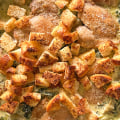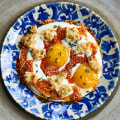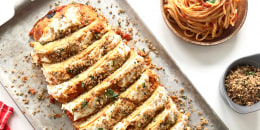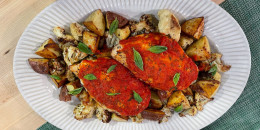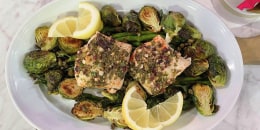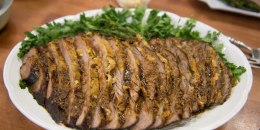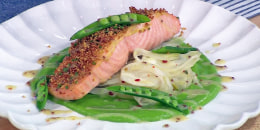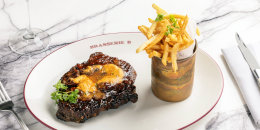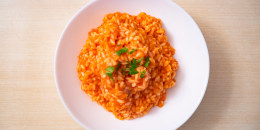Chef notes
Musakhan is perhaps the most iconic of all Palestinian chicken dishes. I often joke that while we don't have a nation-state, we most certainly have a national dish. Extravagant and communal, the chicken is traditionally served whole, steeped in olive oil and reddish-purple sumac. It is mounded over caramelized onions atop a hearth-baked flatbread called taboon and soaked with the cooking juices. People sit around a table, using bite-size pieces of the bread to tear off bites of chicken.
I didn't grow up eating it that way. Ever. My mother, like lots of Arab mothers in the United States, adapted the chicken-onion combo into tortilla rolls. Eating this wrap with sumac and onion juices drizzling down your arms is part of the experience and a sign of a good juicy braise. It's equally great at room temperature and can be served as a party appetizer wrap.
This home recipe is adapted from my restaurant's most popular wrap called the Pali-Cali, since it brings together Palestinian musakhan with arugula, producing something deeply satisfying and easier for non-Arabic speakers to pronounce. I like to add avocado for some extra California love. I think my family in Gaza would approve.
Ingredients
- 1 pound skinless, boneless chicken thighs (about 4 thighs)
- 2½ teaspoons kosher salt, divided, plus more as needed
- 3 tablespoons sumac, divided
- 1/2 teaspoon ground allspice
- 5 tablespoons extra-virgin olive oil, divided, plus more for drizzling
- 6 cups thinly sliced onions (about 2 onions)
- 1/4 teaspoon freshly ground black pepper, plus more as needed
- 1 tablespoon pomegranate molasses
- 4 pieces Saj Bread or your favorite brand of 12-inch flour tortillas
- 4 cups trimmed arugula
- 1/2 cup pomegranate seeds (optional)
- 1 avocado, sliced (optional)
Preparation
1.In a medium bowl, rub the chicken thighs with 1 teaspoon of the salt, 2 tablespoons of the sumac and the spice mix and let them sit for 2 hours at room temperature or refrigerate overnight.
2.Preheat the oven to 300 F.
3.In a medium pan, heat 3 tablespoons of the oil over medium-high heat. Add the onions and 1/2 teaspoon of the salt, and sauté until the onions are soft and translucent and slightly browned.
4.Transfer 1 cup of the onions to an 8 by 8-inch baking dish and set aside.
5.Continue to caramelize the remaining onions on low heat.
6.Arrange the seasoned chicken in a single layer over the onions in the baking dish and drizzle with the remaining 2 tablespoons oil. Cover the pan tightly with aluminum foil and bake until the chicken is cooked through and breaks apart easily with a fork, 55 to 65 minutes.
7.While the chicken is baking, continue to caramelize the onions on low heat, stirring often, until they're very soft and deep golden brown, 20 to 25 minutes. It's important to cook the onions slowly to reduce their liquid and bring out the sweetness. Remove the pan from the heat, add the remaining 1 tablespoon sumac, the remaining 1 teaspoon salt and the pepper, and drizzle with the molasses. Adjust the salt and pepper to taste. Let cool slightly.
8.Using two forks, pull apart the cooked chicken into bite-size shreds and fold the caramelized onion mixture into the cooked chicken.
9.Lay out the flatbreads on a dry work surface and distribute the pulled chicken and onion mixture in a nice straight line down the center of each bread. Top with the arugula, pomegranate seeds and avocado, if desired. Fold in the sides and roll up each flatbread, burrito-style, going from the bottom to the top. Drizzle the flatbreads with a little oil and give them a quick toast in a cast-iron skillet or heavy pan for some color.
10.Serve whole as a meal or sliced into quarters for the perfect party bite. The rolls can be stored covered or in an airtight container in the refrigerator for up to 3 days and reheated or enjoyed at room temperature.


